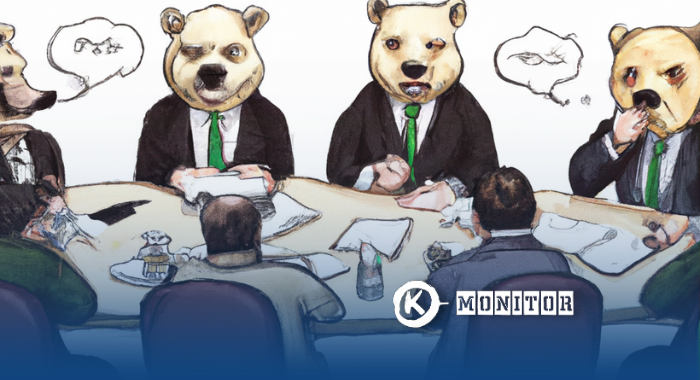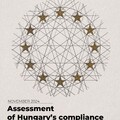In November 2022 we applied to the Anti-Corruption Task Force, which was founded by the Hungarian government under pressure from the EU Commission. Since then, we regularly get the question why we have joined the group.

As we emphasized at the time, our participation in the Task Force doesn’t mean that we recognise the government's anti-corruption measures, it’s rather about highlighting the measures that have not been taken. Now we briefly summarize our experiences of the past few months, and we also look at the most important points for change.
We have expressed our concerns about the limited competence of the Task Force in our publicly shared application, and we’ve also notedthat we hadn’t seen any sincere commitment behind the anti-corruption actions of the government. Moreover, in several cases the commitments called for by the EUhave been weakened or eroded. We have called the attention of both the Hungarian public and the EU decision-makers to these cases. We think that our professional materials and our analyses with our partners have contributed to the fact that the EU has strictly held the Hungarian government to its commitments, and has not been satisfied with inadequate anti-corruption and rule of law measures taken without real commitments. On the other hand, the aim of our work is to help put in place measures that will allow Hungary to access EU funds and then use them for the right purposes in a transparent, efficient way.
We specifically joined the Task Force as we now see a real chance to improve the conditions for anti-corruption efforts (e.g. civil, journalist) and to increase the independence of courts. In our application we set out our aims and have been working towards them since then. As we could only partially incorporate these into the first report of the Task Force, we voted against the adoption of it in March. This is just one example of how the last six months of work confirms many of our concerns.
We can also share some positive experiences
After a decade of harassing and sidelining NGOs, it has been an important step to have substantive debates with government experts, and the continuous operation of thematic working groups is ensured by pre-defined work plans. It’s also a novelty that the government was forced to react to the Task Force ’s uneven report, including the exclusive proposals of NGOs. The dissatisfaction with the results so far doesn’t prompt us to leave the working group since we had anticipated these problems, rather it prompts us to fight for topics which are important to us even more intensively. We believe that we still have an opportunity to make a difference.
When we joined the Task Force, we pledged, and we are committed to:
cooperate with other organizations active in the field of anti-corruption which are independent from the public authorities and economic interest groups. Together with them we represent the views of the Hungarian civil society and the press in order to create legislation and procedures that facilitate the oversight of public funds. Our additional goal is to provide feedback to government bodies, the wider public and the representatives of EU institutions about the ongoing legislation and its implementation, furthermore, the institutional change in the coming period.
We set out the following criteria for the effective operation of the Task Force and now -eight months after its launch - we have assessed them.
|
Ensure in the Task Force the participation of non-governmental actors with independent professional perspectives and relevant work in the field (notably Transparency International), and take into account the views of professionals and professional communities that are not members of the Task Force. We attach great importance to ensuring that the non-governmental members do not include organizations that do not have a substantive and professional track record, or whose independence from government is questionable, or whose funding is predominantly state-funded or opaque. |
Indeed, the Task Force included other civil society and non-governmental actors who are doing relevant work in their field. It is unfortunate that three of the ten non-governmental members have already resigned from the Task Force - we hope that the Task Force will continue to be free of any actors whose independence or professional performance is questionable. In our assessment, so far there has been only a limited possibility to channel the views of non-member professionals and professional communities. This was partly due to the relatively closed operation of the Task Force and the tight deadline for the first annual report. In the future, we should definitely make an effort to rely more on the knowledge of external professional actors in the reports and resolutions of the Task Force. This will require greater publicity and building wider trust in the Task Force, in particular by demonstrating that its work is forward-looking, useful and effective. |
|
The Task Force should not be a substitute for the broad public consultation needed to adopt anti-corruption legislation and measures. |
Unfortunately, there is still no progress on this point - the most striking example of this is the lack of public consultation on the whistleblower protection bill. We wrote more about the bill here. At the same time, it is typical that the non-governmental members of the Task Force are not informed by the government actors about the anti-corruption measures and proposals in advance, and thus in many cases the cooperation between the actors is limited to the minimum required by law. |
|
Access is granted to information, data and statistics without which it is impossible to analyze and discuss corruption problems (e.g. GRECO's fifth round report is still not public). |
Although the Task Force received many new and previously unknown statistics during the preparation of the report, in many cases these were too late to draw any meaningful conclusions for the March 2023 report. For example the GRECO's fifth round report on high-level officials was made public more than a year after it was drafted, and members of the Task Force were not informed about it. |
|
The monitoring of governmental anti-corruption measures and the measures taken towards the EU within the framework of the Conditionality Mechanism are properly ensured. In addition processes and legislation that pose a risk of corruption are identified and honest and critical reports are published. |
One of the reasons why we were unable to vote in favour of the first report of the Anti-Corruption Task Force was that, in our opinion, it lacked honest confrontation and self-criticism. |
|
In addition, we consider it extremely important that non-governmental actors also play a meaningful role in the development and monitoring of the new National Anti-Corruption Strategy to be created by June 2023. |
There are several gaps in this area: although the draft of the new National Anti-Corruption Strategy was completed months ago, it was only shared with those actors who were specifically named in the relevant milestones of the Recovery Plan (OECD, GRECO, European Commission, Task Force). As a civil society member of the Task Force, we have also called for public consultation on the Strategy, because without it, not only citizens, but also interested groups (such as business organizations) are excluded from the review process. After the deadline, the Strategy has still not been adopted by the Government. The opinion issued by the Task Force and -annexed to it- the first version of the draft Strategy are available on the Task Force's website. |
|
After the establishment of the Task Force its recommendations should be followed by substantive governmental actions. |
So far, there are no substantive anti-corruption measures - beyond a government decision to increase competition in public procurement and the first version of the new National Anti-Corruption Strategy, which makes it difficult to assess government actions (although only three months have passed since the adoption of the report). |
|
Use intensive, clear communication to help ensure that public opinion has credible knowledge and support. |
Communication is still a little difficult - although the Integrity Authority's website has been launched, for the moment there is little planned communication related to the work of the Task Force, with much of the work going under the radar. |
In our view, for a more effective Task Force the following items are necessary:
The reform of legislation affecting the Task Force (e.g. the possibility for non-governmental actors to delegate substitute members - this would increase the capacity of the Task Force). We hope that the necessary legislative amendments for this in the near future will be on the government's agenda. As a parity organization it would be especially important that the views of civil actors are prominently reflected in common positions, or even considered substantively. Inform the public more often about the work of the Task Force. It would be important to consult external experts and opinions more effectively, potentially with the allocation of adequate financial resources. Better and faster access to government information, data and statistics needed to carry out the tasks of the Task Force. The Task Force can only work effectively if the government truly recognises its activities and role: the Task Force should be able to actively follow and monitor the anti-corruption proposals and the steps in the implementation of the anti-corruption strategy.
In addition to improving the efficiency of operations, we considered and consider the following anti-corruption issues to be essential:
- the protection of whistleblowers
- the transparency and regulation of political funding
- new system on asset declarations and the expanded scheme of its control mechanism
- adequate regulation of conflict of interest and revolving door phenomenon
- regulation of lobbying, strategic cooperation and priority government investments
- improving the transparency and accessibility of public databases (e.g. company data, register of ultimate beneficial owners, public procurement data, EU and national aid data, budget data, contract data of public service bodies, land register data)
- wide access to data of public interest and strengthening proactive freedom of information
- the reform of the public procurement system, the improvement of procurement culture and the strengthen of competition
- establishing the independence of public supervisory bodies and improving their preparedness and effectiveness
- effective prosecution and sanctioning of high-level corruption
- joining the European Public Prosecutor's Office
- ensuring the independence of the judiciary
- creating the conditions to recover public assets that have become the victim of corruption
- reform of the institutions and rules that manage and supervise the spending of EU funds and improve the integrity of public tendering procedures
- ensuring public participation in preparing laws (especially for women and under-represented social groups in decision-making)
- strengthening the integrity approach of public administration workers and promoting institutional integrity systems
- expanding automatic decision-making (e.g. prosecution, court case allocation)
- planning specific measures in areas particularly affected by corruption (construction, information technology, health, public asset management, land tenders, concessions, sports subsidies).
Of the above written, the Task Force’s workplan only includes the topics of public procurement, freedom of information and tender support, but the National Anti-corruption Strategy, which will be soon accepted, will cover some important areas (e.g. lobbying, conflict of interest, revolving door phenomenon, automatic decision-making). The question is how much role will the Task Force play in monitoring and developing concrete implementation steps and proposals. This is reasonable to doubt since already during the first half a year of the Task Force’s existence a few anti-corruption legislation was adopted (e.g. whistleblower-protection law), the Task Force was however not involved at all in creating or reviewing them. Some of the more sensitive issues that have not been raised in the discussion between the European Commission and the Government (e.g. party funding, accession to the European Public Prosecutor's Office) are unfortunately not expected to be on the agenda of the Task Force for some time.
Translation from Hungarian: Regina Kovács
Címkék: english
Szólj hozzá!
A bejegyzés trackback címe:
Kommentek:
A hozzászólások a vonatkozó jogszabályok értelmében felhasználói tartalomnak minősülnek, értük a szolgáltatás technikai üzemeltetője semmilyen felelősséget nem vállal, azokat nem ellenőrzi. Kifogás esetén forduljon a blog szerkesztőjéhez. Részletek a Felhasználási feltételekben és az adatvédelmi tájékoztatóban.





